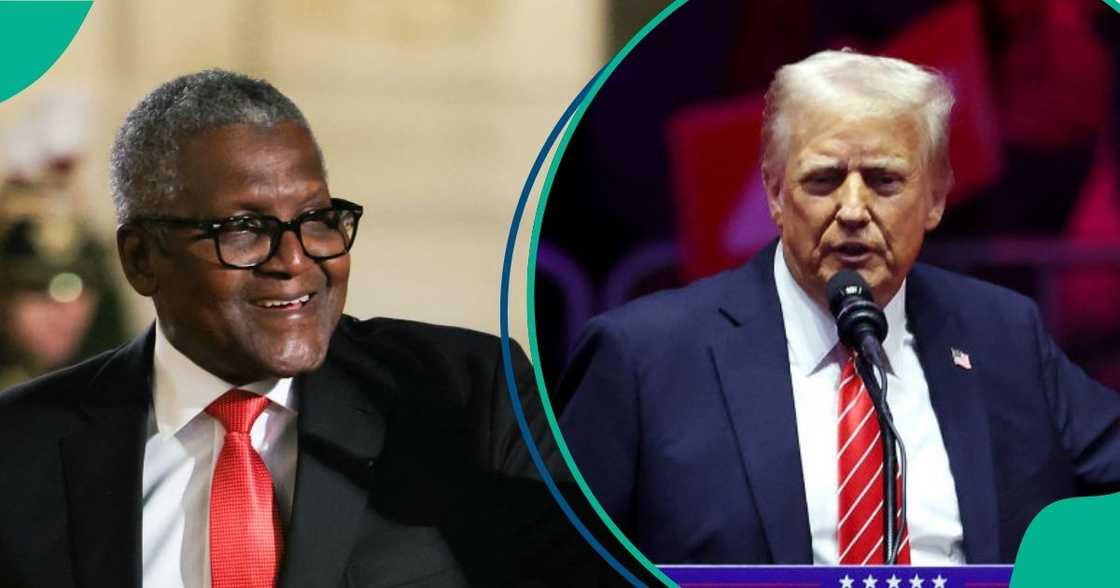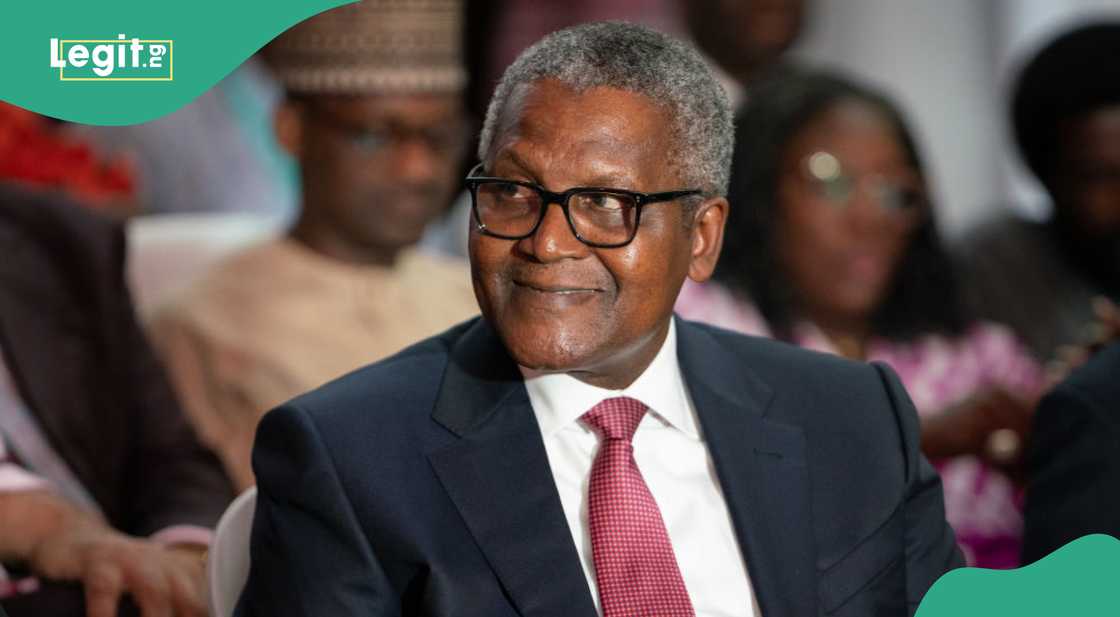Dangote Reacts to Donald Trump’s Tariff as Crude Oil Falls to Lowest in 4 Years
- Billionaire businessman Aliko Dangote has said he was comfortable with the 14% tariff slapped on Nigeria by the US
- Dangote disclosed that he was worried about the effect of the tariffs on his urea export to the US, but relaxed after seeing a heavier levy slapped on Algeria
- Meanwhile, oil prices have declined further, threatening Nigeria’s 2025 budget, which pegged crude costs at $75 per barrel
Legit.ng’s Pascal Oparada has reported on tech, energy, stocks, investment and the economy for over a decade.
Africa’s richest man, Aliko Dangote, said on Thursday, May 1, 2025, that he was okay with the effect President Donald Trump’s tariffs would have on his urea exports to the US because a major competitor, Alegria, had been slapped with a heavier tariff.
Legit.ng earlier reported that Trump imposed a 14% tariff on imports from Nigeria, the largest oil exporter in Africa, as part of his global trade measures, which he later paused for 90 days.

Source: Getty Images
Dangote at ease with US tariffs on Nigeria
Dangote reportedly said during an investment conference in Lagos that his fertiliser plant, which commenced operations three years ago, shipped 37% of its three million metric tonnes of urea production to the US.
The Nigerian billionaire said he was initially concerned about the effect of Trump’s levy on Nigeria.
Dangote said.
“But when I checked who we are competing with, we are competing with Algeria. So luckily for us, Algeria were slapped with 30 per cent. So it makes us a bit comfortable.”
According to a Reuters report, Dangote said he expected revenues from the Dangote Group to grow to over $30 billion next year, from $25 billion forecasted for 2025.
Nigeria-US trade balance
Nigeria's decision to promote local products by banning the import of certain foreign goods has affected its trade relationship with the United States.
Data from the US International Trade Commission shows that Nigeria’s imports from the US in February 2025 were $286.3 million, down from $423.6 million in February 2024—a 32.4% drop.
Overall, Nigeria’s imports from the US dropped from $951.6 million in 2024 to $643.1 million in 2025.
Total trade between the US and Nigeria in the first two months of 2025 reached $1.33 billion.
In January, the US had a $143 million trade deficit with Nigeria, but this changed to a $187 million surplus in February.
Nigeria’s exports to the US rose from $214 million in January to $474 million in February, a 121.5% increase. However, the overall yearly export value fell by 19.9% to $687 million.
Crude oil remains Nigeria’s biggest export to the US. In the first two months of 2025, crude oil made up 64.31% of US imports from Nigeria, valued at $413.6 million.
Oil imports dropped from 3.5 million barrels in January to 1.8 million barrels in February, causing a decline in monthly import value.
Crude oil prices fall to their lowest in four years
Meanwhile, oil prices have seen the biggest decline in almost four years after Saudi Arabia disclosed plans to produce more and expand its market share.
Nigeria’s Brent crude sold for $61.86 per barrel, while WTI crude slipped to $58.21, the lowest since March 2021.
The fall represents a contrast to the market’s performance experienced earlier this year, when prices were about $75 per barrel.
The shift has upset market dealers and shifted global trade dynamics after traders positioned themselves for potential supply disruptions due to the Middle East conflicts.
In early April, Saudi Arabia moved to increase its OPEC+ production in May.
Several members of the cartel will reportedly seek an increase in output for the second month in June as they meet on May 5 to discuss production plans.
Nigeria’s budget is in trouble
Experts have said that Nigeria’s 2025 budget hangs in the balance due to the drop in global oil prices and domestic crude production.
The government benchmarked the oil price at $75 per barrel, with a projected daily output of 2.06 million barrels.
Recall that Nigeria’s crude oil production fell steadily from 1.495 million barrels per day in January to 1.465 million in February, with more drops occurring in March.

Source: Getty Images
The setbacks pose a threat to Nigeria’s economic stability, as oil accounts for the country’s export earnings and more than half of the government’s revenue.
Dangote confirms readiness to meet Nigeria's fuel supply
Legit.ng earlier reported that Dangote Group announced that its refinery had started producing 57 million litres of Premium Motor Spirit (PMS), commonly known as petrol, daily.
This was disclosed during a recent tour of the refinery complex by a delegation from Zambia, led by the country’s Minister of Energy, Makozo Chikote, and also Aliko Dangote, President of Dangote Industries Limited (DIL), to explore a partnership.
After the tour, Dangote stated that the Dangote Petroleum Refinery has enough petrol in storage to meet Nigeria's domestic demand.
The article was updated with additional information by the head of the business desk, Victor Enengedi.
PAY ATTENTION: Сheck out news that is picked exactly for YOU ➡️ find the “Recommended for you” block on the home page and enjoy!
Proofreading by Kola Muhammed, copy editor at Legit.ng.
Source: Legit.ng


